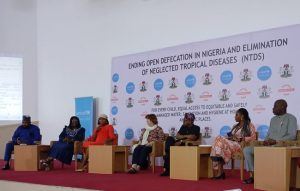The United Nations Children’s Fund (UNICEF) has affirmed its commitment to end open defecation in Nigeria.

Jane Bevan, Chief of Water, Sanitation and Hygiene (WASH), UNICEF, stated this at a two-day media dialogue themed “Ending Open Defecation in Nigeria and Elimination of Neglected Tropical Diseases (NTDs)” in Lagos.
Bevan emphasised that collaboration from all sectors was crucial in achieving this goal.
“We are not just working toward an open defecation-free Nigeria; we are building a sustainable future where improved sanitation drives health, economic growth and environmental resilience.
“We need the government, partners and the private sector to join us in making Nigeria open defecation-free.
“We also need the media to assist us in sensitising the public to the dangers of open defecation.
“By leveraging the power of information, we can create a movement that not only raises awareness but also translates into tangible actions for ODF at the community level.
“We must keep this campaign on the front burner,” she said.
In her remarks, Mrs Chizoma Opara, a Deputy Director, Federal Ministry of Water Resources and Sanitation, expressed concern over the persistence of open defecation in the country.
Opara, who is also the National Coordinator of the Clean Nigeria Campaign, noted that the 2021 WASHNORM reports, revealed that more than 48 million Nigerians still engage in the practice.
“Open defecation is a sanitation and hygiene-related issue and a significant contributor to the spread of NTDs.
“Diseases like onchocerciasis, schistosomiasis, trachoma, lymphatic filariasis, and soil-transmitted helminthiasis (STH) are transmitted through contaminated soil and faeces, perpetuating a cycle of poverty, malnutrition and ill health.
“By addressing open defecation, we can significantly reduce the transmission of NTDs,” Opara said.
Aituaje Iruobe, popularly known as WAJE and a UNICEF Champion, expressed concern on the high rate of open defecation in Nigeria, reiterating her commitment to leading the campaign against the practice.
The event also featured a panel of discussion session where stakeholders deliberated on strategies to eliminate open defecation and related issues.
By Millicent Ifeanyichukwu and Segun Giwa
